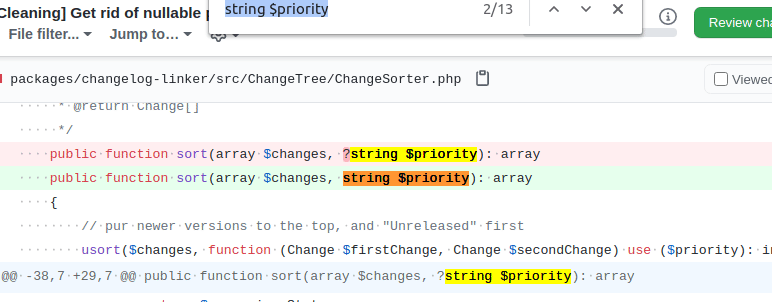It's not Null, it's Enum
Last weekend I got into reading a good old post Null Hell by Afilina, a fellow legacy archeologist. Null parameters are evil, which turns code into "maybe" and "just in case" conditions with ifs everywhere.
I was wondering how difficult it is to get rid of nullable parameters in a project. I made myself a challenge: get rid of nullable params over the weekend. This is what happened.
"Complain about the way other people make software
by making software."
This post will be a hands-on brain insight, how I practically code step by step. I'll share my inner thoughts as they come by.
1. Set a Goal
Symplify is a monorepo of ~40 split packages. The goal is to remove as many nullable parameters as possible.
What is a nullable parameter? A params like these in any custom method or function:
function run(
?string $param,
string $optionalParam = null,
string|null $unionParam
) {
}
That's for theory.
2. Prepare PHPStan Rule
In Symplify, before we start to apply any "just-made-up" rule I've read or heard somewhere, we have to formalize it first. With PHP code, that means "write a PHPStan rule for that".
Why is this step necessary for success? When you read a post about "every class should be final", you might think that's a good idea. It's easy to get hyped in software, so you try to put final everywhere in your code right from Monday. Soon, your project has final in some classes that you worked with. Your colleagues are not hyped yet, and you also broke few Doctrine entities by making them final. Your argument is not very trustworthy now, and people don't like to keep the rule that doesn't have clear boundaries.
By writing a PHPStan rule first, we avoid this whole mess. Also, we realize the ideal statements like "every x should be y" have to be adapted into practical coding habits. While I was writing a ForbiddenNullableParameterRule I learned that:
- nullable
$paramrequired byinterfacefrom/vendor- we should skip these because refactoring the world is not a weekend goal - we need to forbid specific types first to keep refactoring gradually
- we need to allow some types to keep refactoring gradually
We integrated these criteria into the rule itself, and after a couple of hours of coding and testing, it was ready to become part of our CI.
3. Make PHPStan rule part of CI
The PHPStan rule must run in CI. There is no excuse. I've seen a couple of projects where they used PHPStan, had their own PHPStan rules, but they were missing in phpstan.neon.
Let's avoid that mistake:
services:
-
class: Symplify\PHPStanRules\Rules\ForbiddenNullableParameterRule
tags: [phpstan.rules.rule]
arguments:
forbiddenTypes:
- ...
allowedTypes:
- ...
We run PHPStan, and... it reported 130 cases. Yay! That's a doable number of PHPStan errors for a weekend job. If it would be 300+, we'd tune the forbiddenTypes and allowedTypes parameters until the number fits under a hundred.
There is no point in stressing yourself or ignoring everything. Refactoring should be fun!
4. Remove the Null Parameter
Let's look at one typical example that could be spot on many places:

First step would be to remove the ?:
-public function sort(array $changes, ?string $priority): array
+public function sort(array $changes, string $priority): array
{
// ...
}
We've removed the nullable parameter - mission complete! All we need to do now is to fix dozens of new PHPStan errors.
I realized that ?string is a code smell for enum only in hindsight, but I started to be suspicious.
I looked into code and tests for the values that the $priority argument can take. To my surprise, they were the same values over and over again:
$this->sort($changes, 'packages');
$this->sort($changes, 'categories');
$this->sort($changes, null);
It seems the priority was chosen or not. If we put this sentence in the code:
-$this->sort($changes, null);
+$this->sort($changes, 'none');
But should we use strings around the project without any boundaries?
5. Extract the Enum
No. There should be at least constants:
-$this->sort($changes, 'packages');
+$this->sort($changes, PackageCategoryPriority::PACKAGES);
-$this->sort($changes, 'categories');
+$this->sort($changes, PackageCategoryPriority::CATEGORIES);
-$this->sort($changes, null);
+$this->sort($changes, PackageCategoryPriority::NONE);
I've extracted three repeated values to a standalone class:
namespace Symplify\ChangelogLinker\ValueObject;
/**
* @enum
*/
final class PackageCategoryPriority
{
/**
* @var string
*/
public const CATEGORIES = 'categories';
/**
* @var string
*/
public const PACKAGES = 'packages';
/**
* @var string
*/
public const NONE = 'none';
}
Note: the @enum docblock is a marker for PHP 8.1 Rector rule that will be able to refactor it to native enum.
In the end, a single detected enum helped us to remove nullable on ~30 places with a single refactoring.
-public function sort(array $changes, ?string $priority): array
+public function sort(array $changes, string $priority): array
{
- if ($priority === null) {
+ if ($priority === PackageCategoryPriority::NONE) {
}
// ...
}
Now we can repeat a similar process for the other nullables. If you get stuck, you can find inspiration in Symplify PR, where we cleaned all 130 cases.
Happy coding!